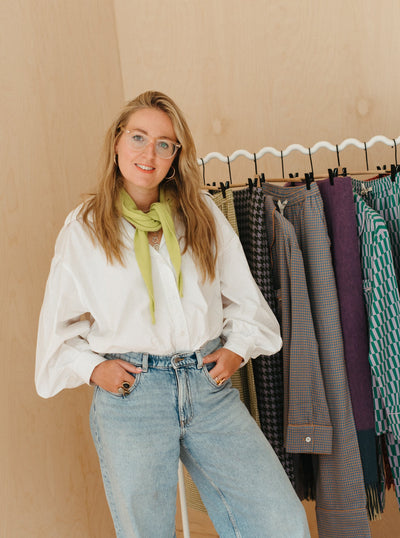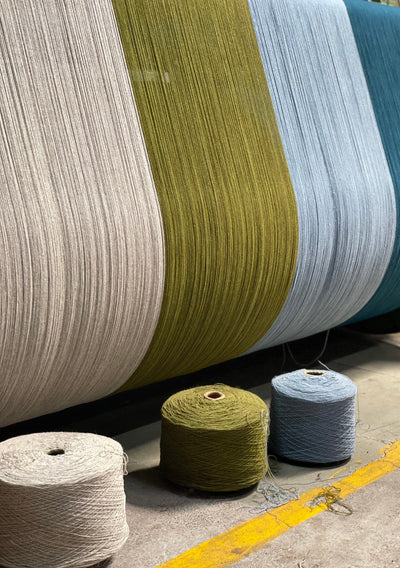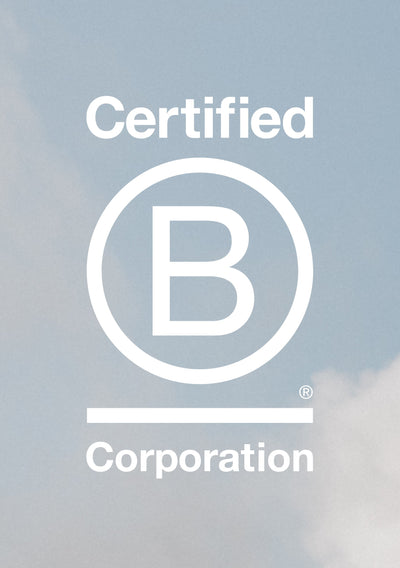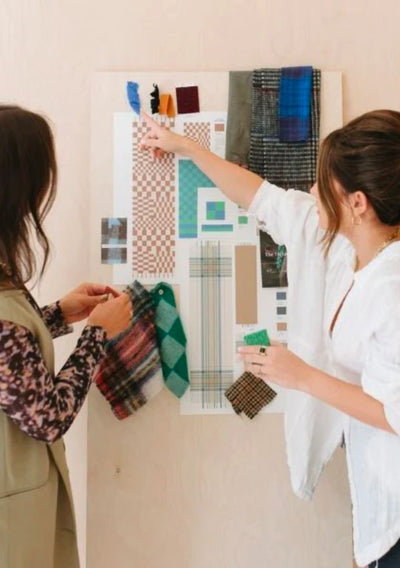Why We No Longer Manufacture in Scotland
Being Scottish, based in Scotland and selling a product that many people identify as Scottish, creates a suggestion that we manufacture our products in Scotland. We don’t, and we want to be super clear that it’s not a secret. We are very proud of our partner mills and what goes into our supply chain and love inviting our community and customers into the behind the scenes journey of how their blankets and scarves are made!
We’ve done some weaving in Scotland but we haven’t been able to make it fit with our core values of how we want to run a business. This is Fergus’ 16th year working for himself, so we can say with confidence what brings us satisfaction, happiness and a sense of achievement from our work. We use that feeling to create our core values as a business and it guides our vision and mission of what we want to achieve. In all things, we strive to be a positive impact company. This means that we believe that business is about more than just profit.
We think the best way to begin describing the company we want to be might be by first pointing out what kind of company we don’t want to be. Since the 80’s, the idea that, above all else, you should bring shareholders increasing returns has become synonymous with ‘good business’. Beating the competition with no regard for what or who you leave in your wake, exploiting workers and even showing reckless disregard for customers. Sounds like a really bad movie, but sadly that’s how many circles in the world of business tend to operate. We believe it’s not the only way. We think that’s the short-term view, and we’re here for the long term.
We try to make long term decisions. These decisions might not show benefit today, but are what we believe have the best impact on the people they affect in the end and can be sustained over time. We call it being a Positive Impact Company and it permeates throughout all of our decisions and those we do business with. Our supply chain is a huge part of that. What’s important to us in our supply chain is that the people we work with share those core values. This means they care about their employees, they care about the animals that produce the wool and cashmere, and they care about their impact on their environment.

So, what is meant by "Made in Scotland?"
Made in Scotland might infer the product is made from Scottish wool and woven in Scotland. The truth is that it can often be mis-interpreted or mis-used. Most often, Made in Scotland tags mean that the product is made with imported wool and woven and finished in Scotland (‘finishing’ means cutting to size, adding the fringes, brushing and cleaning). If you would like a blanket made in Britain from start to finish, look for the small batch makers who specify that they use British wool and weave in Scotland and really ask people about their processes. We’ve seen blankets tagged with ‘Made in Britain’ that were not woven in the UK, and only finished in the UK. We’ve also visited factories in China and elsewhere who proudly showed us samples of blankets they had manufactured (both weaving and finishing) for renowned names, including attaching the label saying ‘Made in Scotland’ or ‘Made in Britain’. This lack of clarity is what lit our passion for speaking proudly and openly about our supply chain. We want to be clear about where we weave and finish all of our products, and we want our community and customers to have full knowledge of the work and thought that goes into each item.
Where Does the wool actually come from?
A big issue with the ambiguity of the ‘Made in Scotland’ statement is that the wool doesn’t usually come from Scotland. The Scottish climate is most suited to sheep with a thick coat for growing up in a windy and rainy climate, which results in wool that is coarse and strong, but a bit itchy. Since it’s not usually very soft, it is used for things like carpets, sofa covers etc. Think of Harris Tweed - a truly amazing material - but not what you would want to use to weave a snuggly blanket. Instead, softer wool is usually sourced from Mongolia, Australia and New Zealand where sheep generally grow finer wool in sunnier climates, and therefore softer.
Many people assume cashmere is inherently Scottish though cashmere goats are not native to Scotland. The luxury fibres are collected from the downy undercoat of cashmere goats, who originate in the Kashmir region of central Asia. Today, Asia is still the largest producer of cashmere wool. There’s a great initiative to create a Scottish herd of cashmere goats which now number over 2,500. It’s a great start, but there's still a bit of progress to be made. For context, it takes the wool from about 5 goats to make 1 sweater, and approximately 4 goats are needed to produce enough fibres for 1 full size cashmere blanket (about 830g cashmere yarn).
 Travelling in 2016 as we continued our search for our perfect partner mill
Travelling in 2016 as we continued our search for our perfect partner mill 
Why does this matter?
Even though wool itself is natural, biodegradable fibre, not all man made practices around the wool industry are sustainable and that’s why this matters. Before we started this journey, we thought all wool was ethical, especially since there seems to be so much of it in Scotland. You don’t have to drive very far into the countryside at the right time of year to see sheep losing their thick winter coats. It hangs off them and blows around the fields, gets stuck on fences and gives the impression that wool is so plentiful, it’s easy to make and collect.
We’ve learned a lot since then, and now recognise that the way that wool is collected and sheep are reared varies hugely around the world and, therefore, where our wool comes from is incredibly important to us. For example New Zealand has outlawed mulesing (removal of easily infected skin around the buttocks of a sheep) but Australia has not. So if we’re sourcing wool from either of these countries, it’s important for us to understand where - often back to the actual farm to have full traceability of how those sheep were treated.
What’s our solution?
With all of this in mind, we’ve put a lot of time and thought into understanding our products’ journey from end to end and sourcing the best and most sustainable wool. We’ve refined our supply chain to work with partner mills who we truly believe in, and who also believe in us and our mission in return. We’ve chosen to discontinue manufacturing in places where traceability became a bit too blurred or the wool sourcing was unclear, as was the case with the mills we worked with in Scotland, and have chosen to focus on a more transparent route where the visibility is straight-forward and easy for us to access.
 Sharing a fun (chaotic) family dinner with our Mongolian partners on their trip to visit us in Scotland
Sharing a fun (chaotic) family dinner with our Mongolian partners on their trip to visit us in Scotland
RECYCLED WOOL
All our recycled wool comes from India. There is a huge textile recycling industry in India where countries around the world, including the UK and US, ship their unwanted textiles. We’ve not been able to find anything comparable anywhere else in the world. Old clothing and textiles are sorted by colour, broken down and respun into new yarn which can then be woven into blankets. By sorting the items into colours the amount of dying required is significantly reduced. Blue sweaters become blue yarn which is woven into blue blankets. Some colours (whites and blacks) are not dyed at all. If any additional dying is required, safe AZO free dyes are used to ensure vibrant long lasting colour. When the recycled woollen fibres get broken down for respinning, they become quite short which can be difficult for weaving. Mixing them with other recycled fibres, such as polyester from the production waste of synthetic spinning plants or unwanted recycled clothing add strength, allowing for a dense and durable weave that is even machine washable.
By working closely with our trusted partner mills in India, where 50% of the population earn less than $400/month, we can have a much greater positive impact than by manufacturing in a rich country such as the UK. For example, one order of 1,000 blankets may provide work for, say, 50 people for a month in India, while in the UK it could provide work for 5 people for a week as we rely more heavily on machines and automation. Our partner mills in India also employ a large, primarily female workforce to hand finish the fringing on our blankets, and it’s not because it’s faster or better. In fact it’s slower and results in a bit more irregularities, but relying on people instead of efficient machinery allows us to support a community in need of work opportunities for women.

LAMBSWOOL AND CASHMERE
All of our lambswool and cashmere comes from Inner Mongolia. We chose to work here because the climate and breeds of sheep create luxuriously soft wool. We also tap into not just great wool but a whole community process. The farmers who rear the animals, the spinners who spin the yarn and the weavers who create the blankets are all part of a single interdependent community - indeed often part of the same family. By having everything happening in one place it’s much easier for a small company like us to visit and have visibility into the whole process. Their people-led traditional farming methods not only support the community’s primary industry, it also means that the sheep and goats get much more individual attention and are cared for better as a result.

1% for People + 1% for the Planet
This is closely coupled with our 1% for people + 1% for the planet positive impact pledge, where we donate one percent of revenue to environmental charities, and one percent to people. This means that 1% of all our sales will go back into providing real benefit in the most effective way possible to the people who need it most. We opened this conversation with our production partners to ask who they think could benefit most from our donations and we received amazing responses. One example was from Inner Mongolia where farmers may have unfortunate circumstances that lead to them not being able to care for their flock of sheep, or not be able to produce enough wool to make a reasonable living to provide for their family one year. We want to support these people to ensure that our supply chain and those it touches is healthy and flourishing.
Something we believe will help hold us accountable for our actions and also help ensure that we have the correct tools and resources to fully achieve our mission is to become a B-Corporation. Being a B-Corp means that as a business you balance purpose and profit, and use your business as a force for good. It is a long and challenging process (as it should be) and not something that can be achieved overnight, but we believe anything truly worthwhile is not about being easy. Our journey to becoming a B-Corp has begun and we can't wait to deliver updates to you about our progress.
We want to be open, transparent and inclusive in what we are doing, how we run our business, what our mission is and how we are turning intentions into actions. As we grow, we want to do so with humility, openness and willingness to recognise and adapt our thinking. Have you been thinking about more things brands can do to be sustainable and considerate? Let us know! We truly believe in the power of community and that many heads are better than one!
We intend to continuously re-address and evolve our thinking and our practices, and most importantly, take steps towards long-term and far-reaching positive impacts. We made it our mission to be a positive impact company because we strongly believe the importance of leaving a positive handprint on this planet and a little bit more love in our wake. We believe love always is and always should be the ultimate goal.
With Love,
Emma & Fergus Macdonald

































